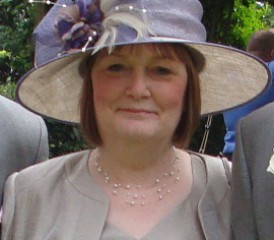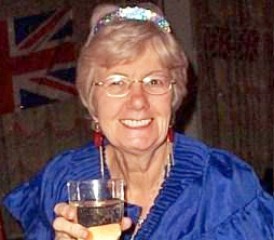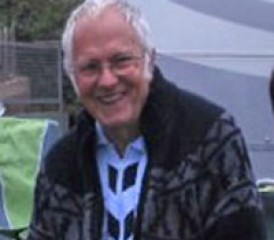Christine S. | Survivor Insight Series

Fact Checked | Written by: Ben Leer | Last Update: 11/06/2024 | 10 Min Read
We spoke with Christine S. as part of our ongoing Survivor Insight series.
Christine is a survivor and fighter of epithelial malignant mesothelioma.
Like many other women diagnosed with mesothelioma, Christine suspects her exposure to asbestos stemmed from her father’s clothes after he came home from an asbestos cement plant where he worked.
She says doctors had misdiagnosed her with other ailments before a biopsy determined she had mesothelioma. Her reaction to the diagnosis was shock. Christine knew about asbestos, but wasn’t aware of how deadly the mineral could be to the human body.
Christine joins us for a conversation about her journey, talking about her treatments, reactions from her family and coming to terms with the mesothelioma diagnosis. Her last name is being withheld over privacy concerns.
What were the events that led up to your diagnosis?
For nearly a year I was diagnosed as having pleurisy and pneumonia. I didn’t realise you could keep getting pleurisy that often, but you put your trust in your GP [General Practitioner] and I was also referred to the local hospital for treatment.
I soon realised something wasn’t right and was fed up being fobbed off by whichever GP I was seeing. They all said they couldn’t hear anything on my lung/chest and would ask if I had been stretching or lifting heavy items, which would explain the pain in my lung or sometimes my shoulder and being breathless.
So I changed my doctors. By this time I was in more pain and could hardly catch my breath. I was told I had fluid on the right lung which was causing the pain, not pleurisy or pneumonia. Eventually, after lots of tests, x-rays and scans I had my lung drained, but if just filled straight back up again. I went to the Freeman Hospital in Newcastle and I had my lung drained again and a VATS [Video-Assisted Thoracic Surgery] procedure to stick the lung back up again, and a biopsy. The result of the biopsy was mesothelioma.
Did you have a biopsy prior to the biopsy that lead to the mesothelioma diagnosis?
Yes, but that was on my thyroid.
When were you diagnosed?
11th October 2007.
Was your mesothelioma caused by asbestos? Can you remember coming in contact with asbestos?
My father mixed asbestos cement at his work. He would come home in his overalls and my mother would wash them. He would lift my brother and me up when coming in from work to greet us.
Did your father have any health related issues related to asbestos exposure?
He was normally a fit man. Near the end of his life he had chest complaints and refused to go for an x-ray, the ambulance even came to the door for him, but he had this fear of cancer and refused to go. Shortly after this he suffered a stroke and ended up in hospital and died a few days later. A doctor told me and my brother that my dad had a shadow on his lung and [asked if] were we aware of anything relating to it. We just said he was frightened of having cancer. So we never really found out what that was. He had been a heavy smoker, but had stopped around the age of 40.
Had you heard of asbestos before your diagnosis?
I must have, but I wasn’t familiar with anything to do with it.
Where did you turn to for information?
At first my doctor and oncologist and I could ring [phone] my lung nurse. I was given booklets on mesothelioma. Then I found out about the Mick Knighton site online and it turned out to be up here in Newcastle. Further treatments I found out through Jan Egerton and Debbie Brewer. The MacMillan site where you can chat to other sufferers is also helpful where you can share with others.
What was your reaction to hearing your diagnosis with cancer?
Total shock. I even thought they had made a mistake as the doctor was also shocked as he didn’t expect it to be mesothelioma (meso) and he asked me if I had worked in the shipyards. I laughed as I thought he was cracking a joke. I hadn’t even heard of meso and asked him to spell it for me. I had gone in to see the doctor myself and left my daughter in the waiting room and told her I wouldn’t be long. I thought it was strange that this nurse came for me and said, we are going in to see the doctor now and I thought well I know I am, but why do you need to come too. Then I looked at her badge and it said her name and Lung Nurse and then I knew something was up. When I was told [about being diagnosed] I had a few tears, but I remember thinking no, keep it together I have to be strong for my daughter sitting outside and the rest of my family and friends. I was taken to another room and the Lung Nurse told my daughter as I just couldn’t speak at that time. My daughter went into shock.
What has been your family’s reaction?
Devastated. My daughter was my rock at the time, as I was separated from my husband then and my son was living with him. My brother was in deep shock. My parents are dead.
How did you come to terms with your diagnosis?
I think personally I pretend I don’t have meso and get on with my life as before and sort of stick two fingers up at it. So I guess that’s me coming to terms with it if you like. I don’t want people to feel sorry for me. The majority of people are surprised I am still here. It was all doom and gloom at the beginning and the chemo wasn’t a bed of roses, but [it was] something you had to do to live longer.
What treatments are you using to battle mesothelioma?
I have had 6 courses of chemo alimta. It definitely helped me as it shrunk the cancer after 3 lots of chemo which took 7 hrs for each one. I had had enough by then and was ready to throw the towel in, but when the oncologist said it had visibly shrunk I thought it [the chemo] could shrink it even further if I carried on with it. My oncologist agreed that I was suffering the side effects etc. and decided to change the cisplatin part of the chemo to carboplatin. This mixture was a lot easier on my system and took only 4 hrs. I also had to have a blood transfusion during the chemo treatment. I considered going to America to try cryoablation after talking to Jan. I contacted the doctor there who asked me to send my scans to see if he could help me. So I spoke to my doctor and oncologist and they both agreed that after chemo my meso had shrunk twice [after 3 sessions and then again after 6 sessions] and that I would be wasting my money at that time as my meso wasn’t at a stage to warrant further treatment.
What was your mentality while going through treatment and battling mesothelioma?
Because I felt well after the biopsy and my lung no longer filled with fluid, which caused a lot of pain, I was ready for the chemo. Then after 3 lots of chemo I started to feel like an old woman, but I talked about all my problems and expectations with the doctor, oncologist and lung nurse. Of course all of this chemo treatment is a major thing for anyone and it takes its toll mentally, but you have to come back fighting and try and be strong to continue through the treatment, especially in my case when it was working. I was ready to pack it in until I found out it was working. Afterwards it takes time to get back to being and feeling normal again, well as normal as you can be. Every now and again, in the beginning, I would be overwhelmed by meso and cry a lot. I am at the stage now [coming up to 4 years] and I no longer feel overwhelmed because I have come to terms with it. We all have to die of something and this might not even kill me, I might get knocked down by a bus. I am a diabetic and have high blood pressure. My high blood pressure put me into hospital during all this, but it has all settled down. So it pays to try and stay calm, easier said than done, go through whatever treatment you have to in order to live longer and I try to live my life involving family and friends as best I can. I have bad days with the pain and you don’t have to suffer there as your doctor or lung nurse can sort you out with whatever painkillers suit you.
What were the cancer awareness events you participated in?
Cancer Research UK Relay for Life, two years running as a survivor.
What kind of effect did this have on you?
Very emotional being with other cancer sufferers, we were called survivors and we did a survivors lap for the first lap and non sufferers applauded us all. One particular lady I did the first event with is now dead and she had meso that really affected me, but you have to continue the fight.
Can you tell me more about your Cancer UK 24 hr walk team slogan and why you chose it
I am normally not very good at thinking up names and we all came up with different slogans. I chose Faith as you have to believe in yourself to get through all you have to and I also have absolute faith in God. Hope as you need that, it helps and Chemo as that has given me a fighting start.
Do you continue to participate in cancer awareness events?
Not that particular one as it moved location. I do other fundraising things when I can for the Mick Knighton Mesothelioma Research Fund.
What advice would you give to someone who has just received a diagnosis of mesothelioma?
Give yourself time to come to terms if you can. Be advised by your doctor/oncologist what the best treatment is for you. Normally chemo is started straight away. There are other treatments available depending on how fit you are and if you aren’t given any information from your hospital, go online and find out whether you could qualify for an operation or go on a clinical trial etc.
We would like to thank Christine for sharing her experiences with us and all mesothelioma fighters that continue to blog and reach out to the community. Learn more about the Mick Knighton Mesothelioma Research Fund.
How has cancer changed your life? Do you have any words of advice, encouragement, or support for others? Continue the conversation on Facebook .





